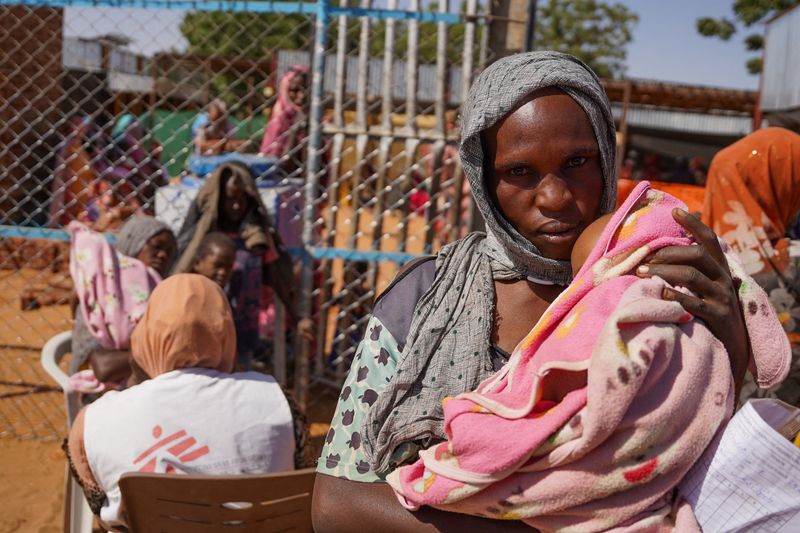
Aid workers claim that as famine increases, Sudan’s RSF is restricting relief supplies
According to humanitarian workers, a Sudanese paramilitary group engaged in combat with the army has imposed new restrictions on assistance supplies to areas it is attempting to establish control over, including those where famine is developing.
The action might further polarize the nation, which broke away from South Sudan in 2011, as the paramilitary Rapid Support Forces attempt to establish a rival government in the west of the country while losing ground quickly in the capital, Khartoum.
Additionally, it increases the risk of malnutrition for hundreds of thousands of civilians in the western Darfur region, many of whom were uprooted during earlier conflict cycles.
During the more than two years of conflict that are still going on in Sudan, relief workers have previously accused RSF fighters of stealing aid. Hunger and sickness are allegedly made worse by the army’s denial or obstruction of entry to RSF-held areas.
Speaking to Reuters on condition of anonymity, a dozen aid workers claimed that since late last year, the RSF has started to demand higher fees and oversight of operational procedures like hiring local employees and providing security, imitating army-aligned authorities’ tactics and further restricting access. The RSF’s actions, which assistance organizations are attempting to oppose, have not been publicized before.
The United Nations refers to the conflict as the biggest and most catastrophic humanitarian crisis in history. It started as a power struggle between the army and the RSF.
Acute hunger affects around half of Sudan’s 50 million people, primarily in areas that the RSF controls or threatens. The number of displaced individuals has exceeded 12.5 million.
USAID budget freezes are predicted to make matters worse, and aid organizations have not been able to deliver sufficient support.
The RSF’s aid administrator, the Sudan Agency for Relief and Humanitarian Operations (SARHO), issued directives in December that Reuters was able to view. The directives stipulated that humanitarian organizations must register through a “cooperation agreement” and establish independent country operations within RSF territory.
Aid organizations claim the limitations remain in place even though SARHO agreed last month to halt the orders until April.
According to the relief workers, the RSF’s pursuit of international legitimacy is one factor driving the tightening of bureaucratic rules, but it also provides a means of raising money for a movement that is experiencing military reverses but still controls large portions of the nation, including nearly all of Darfur.
With little indication of a clear victory, the war’s momentum has fluctuated on the battlefield as both parties rely on domestic and international assistance.
But according to a Reuters writer, the army has quickly retaken areas of the capital that the RSF had controlled at the beginning of the conflict, including the presidential palace in Khartoum.
“IMPOSSIBLE CHOICE”
Aid workers claim that not registering with SARHO causes unjustified delays and the denial of travel permits, but that doing so could result in expulsion by the army and its affiliated government in Port Sudan.
This gave humanitarian agencies a “impossible choice,” MSF Secretary General Christopher Lockyear said earlier this month before the U.N. Security Council. “Either way, lifesaving assistance hangs in the balance.”
The percentage of groups experiencing delays in obtaining travel permits into RSF area rose to 60% in January from 20–30% the previous year, according to data published by the Sudan INGO forum, which represents non-governmental organizations. After SARHO temporarily halted its recommendations in February, that only slightly decreased to 55%.
The U.N. Office for Coordination of Humanitarian Affairs stated in its operational update this month that “engagement with SARHO is becoming increasingly challenging.”
According to Clementine Nkweta-Salami, the top U.N. official in Sudan, SARHO’s demands run the risk of “corruption and aid diversion” in February.
Both sides deny obstructing aid.
Abdelrahman Ismail, the head of SARHO, stated in a Reuters interview that the organization was carrying out its legal obligations and rights.
“International humanitarian law gives us the right to organize this work via flexible, straightforward procedures, and in fact dozens of local organizations and a limited number of international organizations signed on,” he stated.
He claimed that the army-backed government in Port Sudan was putting pressure on international organizations to avoid doing business with SARHO.
“SCARED AND HUNGRY”
The famine-stricken areas surrounding the city of al-Fashir, the army’s beleaguered last stronghold in Darfur, and the adjoining town of Tawila, where tens of thousands have sought shelter, are where aid workers say the restrictions have had the greatest impact.
Famine has been certified by a global hunger monitor at three displaced people’s camps near al-Fashir: Zamzam, Abu Shouk, and al-Salam.
In an effort to drive the army and its supporters out, the RSF has also shelled the camps in recent weeks.
“The situation in Zamzam camp is very difficult, we are hungry and scared,” Haroun Adam, a 37-year-old camp resident, stated. “We aren’t receiving any form of aid, and people are eating leaves because there’s no food.”
Aid workers claimed that the RSF was raising fees for a number of aid operations, such as recruiting local employees and transporting goods, in addition to requesting control.
According to one aid worker, “the more foothold they have to ask for fees,” the more interaction there was between the RSF and assistance organizations.
Ismail claimed that SARHO was enabling access and that charges of meddling and excessive fees were untrue lies spread by the government supported by the army.
Kholood Khair, a Sudan analyst and director of Confluence Advisory, stated that obstacles to aid are not new in Sudan, where the government has attempted to control relief efforts for decades.
Aid workers say the RSF, which says it represents the historically marginalized peripheries of Sudan, is playing the same game.
According to Khair, the strategy was a “harbinger for what an RSF government will look like”.
All Categories
Recent Posts
Tags
+13162306000
zoneyetu@yahoo.com



